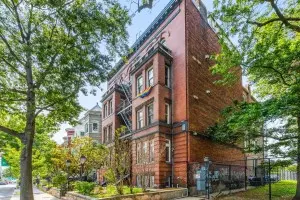Wall Street Landlords Loved These D.C. Suburbs. Rent Control Ended That.

Getty Images
Wall Street’s landlords have long embraced two Maryland counties next to Washington, D.C. Multifamily buildings in these suburbs cater to a steady stream of federal employees, making their rental properties some of the most attractive in the U.S. to institutional investors.
That all changed this summer.
In July, Montgomery County and Prince George’s County enacted laws that limit rent increases to either 6%, or 3% plus the inflation rate, whichever is lower.
Because the new laws restrict rent increases not just on apartments where tenants are living but also on vacant units, they are considered among the strictest in the country.
Multifamily transaction volume in both counties was down 13% in the first three quarters of 2024 compared with the same period in 2023, according to data from MSCI Real Assets.
“There’s no question that [the rent restrictions] had more than a chilling effect,” said Scott Melnick, president of Montgomery County-based brokerage Melnick Real Estate Advisors.
Apartment owners expect the new legislation will curb their ability to finance redevelopment and upgrades on existing properties, since they don’t know whether they can succeed in getting an exemption.
More than the specific features of the rent laws, institutional investors have been deterred by the perception of a more aggressive regulatory environment and its uncertainties.
“There are so many unanswered questions that right now, everything is really, just truly on pause,” said Christine Espenshade, vice chairman of multifamily capital markets at real-estate firm Newmark.
Many of the country’s largest institutional investors are multifamily owners in the Maryland counties that are now subject to the new rent regulation measures, including Equity Residential, UDR, Starwood Capital Group and Blackstone.
Investors tend to strongly oppose rent restrictions and haven’t welcomed the regulations in Maryland.
“The goal should be creating more units of affordable housing,” said Barry Altshuler, Equity Residential’s executive vice president of investments. “Numerous studies have shown that rent control does not accomplish that goal.”
Elected officials in the Maryland counties are hardly alone in feeling the heat to address housing costs. Nationwide, tenants experienced double-digit rent hikes amid the pandemic.
In July, President Biden called on Congress to pass national rent control that would force corporate landlords to cap their rent increases at 5% or else forfeit their federal tax breaks. Capitol Hill didn’t adopt that proposal but local jurisdictions continue to experiment with rent control as voters demand lower housing costs.
Montgomery County Council member Natali Fani-González, who sponsored the county’s new rent law, said she received a flood of phone calls when she took office at the end of 2022. Her constituents were incensed by 15% and 20% rent increases over that year, after pandemic-period rent moratoriums expired. Those increases were roughly in line with the nationwide rise in rents.

Ricky Carioti/The Washington Post/Getty Images
The Maryland policies include exceptions for some developers and landlords. They don’t apply to new construction, for example, and landlords can petition for exemption if they prove their renovation expenses require higher rent hikes.
Even so, these landlords have other worries. President-elect Donald Trump’s proposals to cut the federal workforce could also threaten a key driver of the area’s rental demand.
Local real estate outposts are reeling from the drop-off in business. CBRE Group typically transacts dozens of deals between the two counties each year. This year, it has completed only eight multifamily transactions in Montgomery County and six in Prince George’s County, according to the firm’s internal data.
At brokerage Eastern Union, multifamily transactions in Montgomery County and Prince George’s County declined 80% this year compared with 2023, according to David Merkin, who oversees the firm’s mid-Atlantic office.
The recent investment exodus may reflect a temporary reaction. But housing economists often warn that rent restrictions can scare away developers and investors, choking off new supply and renovations and worsening affordability issues.
“In general, rent stabilization programs don’t end up helping the people that they are intended to help,” said Lisa Sturtevant, chief economist at Bright MLS, a real estate technology company.
Fani-González said she tried to pass a law that protected tenants without suffocating new development.
“I did my best to ensure that it was a well-balanced piece of legislation,” she said. “Nothing is perfect.”
Fani-González added that she is tracking the outcomes of the policy as it gets implemented and will seek to amend it if necessary. For example, if the provision restricting rents on vacant apartments hurts existing housing, she is open to repealing it.

Getty Images
So far, possibly because the rent regulation doesn’t apply to new construction, applications to build new developments in Montgomery County haven’t slowed down, according to Jason Sartori, the county’s planning director.
While some investors and landlords lean into panic mode, others are optimistic that investment interest in Montgomery and Prince George’s counties will bounce back, especially if property values decline and create bargains for new buyers.
“Absolutely, they’ll be back,” said Merkin of Eastern Union Funding. “At the end of the day, D.C. is still a strong market in its surrounding areas.”
For now, the biggest beneficiary may be apartment building owners in northern Virginia. In that other hot spot for government commuters, multifamily transaction volumes over the first nine months of this year are 155% higher compared with the same period in 2023.
Northern Virginia “is now being considered a top-three market nationally for institutional multifamily investment,” said David Leopold, senior vice president and head of affordable housing at commercial property lender Berkadia.
Categories
Recent Posts










